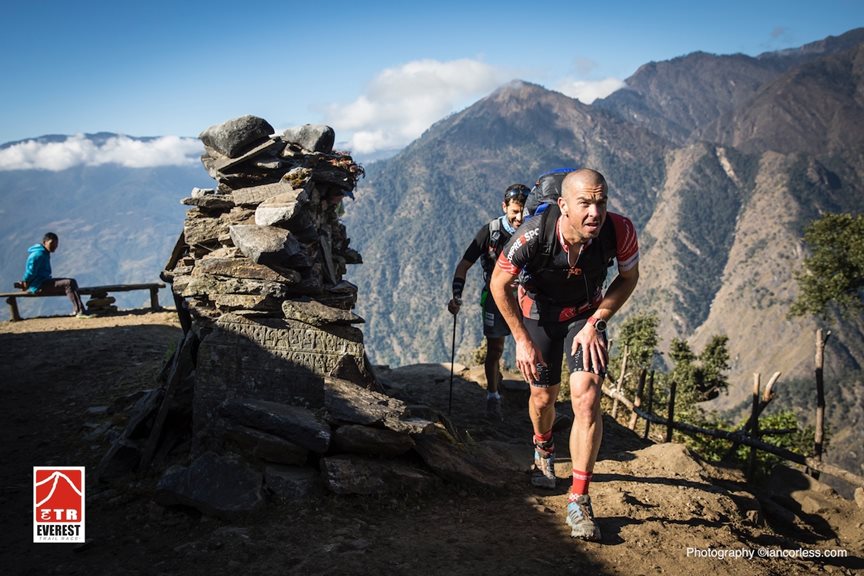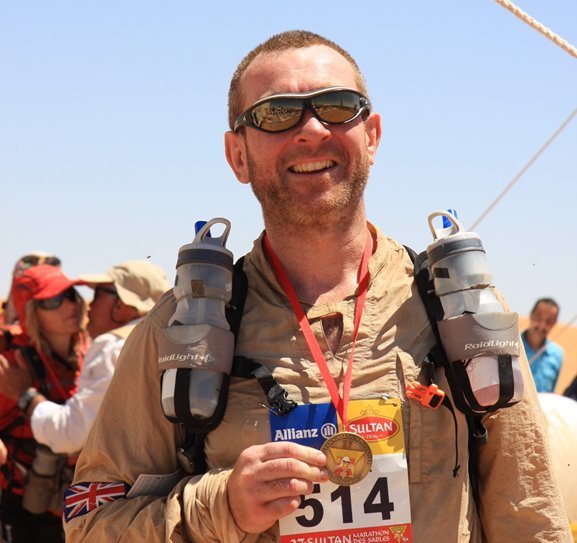Last updated: 06-Nov-18
Background
Susie is a mum who has been doing ultras for 2 years and has completed the Marathon des Sables (MDS). Susie loves the scenery and people you meet doing ultras. Read about Susie’s good and bad times and her top tips for success in ultra running.
Q. How long have you been doing ultras?
A. I have been running since 2011, and my first ultra was in 2012, so only 2 years.
Q. How did you first get started doing ultras?
A. I had completed my 1st marathon and read about the Marathon des Sables, I put my name down for that – and decided I ought to try to run an ultra to see how I got on! I ran a 72 mile in June in the UK. I figured if I didn’t make it in that I would never survive 6 days in the Sahara desert.
Q. What motivated you to start running?
A. I initially started to keep my brother company as he trained for a marathon – then became part of a local fitness group and we all encouraged each other to enter races. It escalated quite quickly once I got my first medal!
Q. When did you do your first ultra race?
A. My first ultra was in 2012 – and I ran a 2 day race around the Isle of Wight and I absolutely loved it. I have completed several ultras races and training runs since then.
Q. Why do you keep running ultras?
A. God knows…. kidding… It’s always surprising how far you can push yourself. I enjoy the challenge of them They are different to marathons and other distance races. The emphasis is on the experience rather than time. People who run ultras are my sort of people. Races often take in beautiful scenery and places I would not normally travel to. As races they are so immersive and I don’t see myself stopping. Always on the look out for a new challenge and experience!
Top tips for running
Q. What are the essential ingredients to being successful in ultras?
A. Perfecting your fuelling and kit really helps. However, nothing is more useful than mentally being ready for a race. Training is obviously essential, but understanding that you will have highs and lows and staying strong in your mind can be enough to get you to the finish line. Even if there are several other things which have gone wrong for you, staying positive is the most powerful thing.
Q. What tips would you give to someone doing their first ultra?
A. Day on day training is good – getting yourself used to running on tired legs. Experiment with food and find out what works for you and what you can eat. You might find that something you enjoy eating is much less appealing 25 miles into a race. It’s easy to forget to drink enough – especially if it is not a warm race. Make sure you have tested your kit out so you are familiar with it and where everything sits within the bag, It’s also important to give your body good rest days to recuperate and recover.
Q. What type of kit do you feel is essential for an ultra?
A. The correct footwear for the race is essential. Footwear is a very personal choice, it doesn’t matter if it’s a low trainer or built up trainer as long as it works for you and matches the terrain. A bag is also a key bit of kit – access to water (by bladder or bottles) needs to be easy. Make sure you have room for nutrition and other kit items you may want to carry with you. I sometimes am out for so long the temperature has dropped so much that I have needed to put hat, coat and gloves on. The bag will be a balance of weight and size versus what you want to fit in it. Test your bag on training runs so you get used to it.
Q. What is the one thing you never travel without?
A. Apart form the usual safety kit and food/water – I always run with electrolytes. Even if it is not on the essential kit list I will bring my phone for various reasons. For post race, I have Sudocrem (works a treat on the feet) and anti-inflammatory painkillers.
The good times running
Q. What is your proudest achievement to date?
A. Marathon des Sables. It’s everything you imagine it to be. Utterly beautiful and you really do make friends for life. Fantastic race.
Q. What has been your favourite ultra to date?
A. Mds was good for obvious reasons stated above. However I really enjoyed Round The Rock – a race round Jersey. Fantastic course, welcoming places and people and a bit of everything. BBQ at the finish too! Any multi day races that Extreme Energy UK put on are good quality too.
Q. Which type of ultras do you like best?
A. For me it is the multistage races. Day on day. You are living in a bubble and your race strategy is a bit more involved. You get to meet fellow runners in between the days. You get a real sense of being it the experience together. They are my favourite!
The rough times running
Q. What has been the most challenging ultra to date for you?
A. I have had one 2 day race where I had a niggling injury from a very early stage. I was also not very well, and I struggled. Mentally it was one of the toughest things I have done. Perhaps I should have stopped, but I didn’t, and when I went over the finish line after. Afterwards I was glad I did not give up.
Q. What aspect of ultra running is the hardest for you?
A. Making sure I have taken on enough nutrition. I love food, but I tend to lose my appetite after running for a while. I struggle to eat anything in ultras. For the longer runs I really have to force feed myself, and it can be quite grim.
Salvation time
Q. Who or what has been your biggest help in doing ultras?
A. Running with my friends and boyfriend. I have done so many miles by myself which I am quite used to, but it’s always good to meet up with other runners and be sociable. The time goes by quicker too! My boyfriend is an ultra runner, where possible we will do long training runs together.
Q. Have you made any significant sacrifices to complete ultras?
A. I’m a mum. Training for big races can consume quite a bit of time, so I try to make it up to my daughter with quality time. I hope when she is older she will understand.
Learning
Q. What have you learned by doing ultras?
A. I’m always learning. Every race I will meet new people, races can differ so much in experience. The key thing I have learnt is that you really do not need much to live. In a self sufficient race – you look at your small bag of gear and food and realise that’s all you need to get by. That and good company. It’s quite a good leveller.
Q. How do you feel ultras have changed you and your life?
A. I have a different outlook. It has become a way of life for me now. It’s a hobby, but a consuming one. I look at races and want to do them all. A few years ago I hadn’t run a single mile and was terribly unfit. You realise that the human body is remarkable and anything is possible if you focus and really want it.
Q. Any helpful sayings or beliefs that have helped your running?
A. Not sayings as such. I have positive imagery I use when I’m flagging… I think about the finish line, my daughter, the feeling when you get the medal. The rest that awaits me at the end!
Q. How do you get motivated to do the training?
A. I always have a race in the calendar. That helps me enormously. I used to be very structured in my training schedule – but now I run to how I feel. If I am tired then it’s ok to have shorter training day. Some days it is hard, especially if I’m training in adverse weather. However I am yet to complete training and regret having made the effort, and that goes through my mind when I’m putting my trainers on and not quite feeling it.
Training and Preparation
Q. How do you train for an ultra?
A. Lots of back to back runs. Obviously there are long training runs in there too, but not all are very long runs. Sometime I find running mid distance three days in a row is as good a training. I cross train a fair amount. I cycle quite a lot and make sure I do lots of strength training and bootcamp for general fitness and Bikram yoga to help avoid injury.
Q. How does your training differ for each type of ultra?
A. To be honest I generally just keep roughly the same sort of training regime. I do try to train towards a particular ultra sometimes. Specific heat training for the Marathon des Sables, and lots of hill training if I have a hilly race coming up. Trying to find similar terrain to train on definitely helps.
Future
Q. What race are you doing next?
A. I have a trio of races in successive weeks. London Marathon, then Boston Marathon, then Thames Path 100 mile race. Next big Ultra is Ring O Fire in the summer, and going back to the Sahara in 2015. Lots of races in the diary!
Q. What do you hope to achieve with your ultra running in the future?
A. I would like to get faster at it. Other than that I am happy to keep exploring new places and races. My race bucket list is huge!
Q. What would be your dream ultra event?
A. Badwater. It’s such and iconic race, it’s hot tough and very long. It’s also hard to get into. For me – that is my ultimate race.





